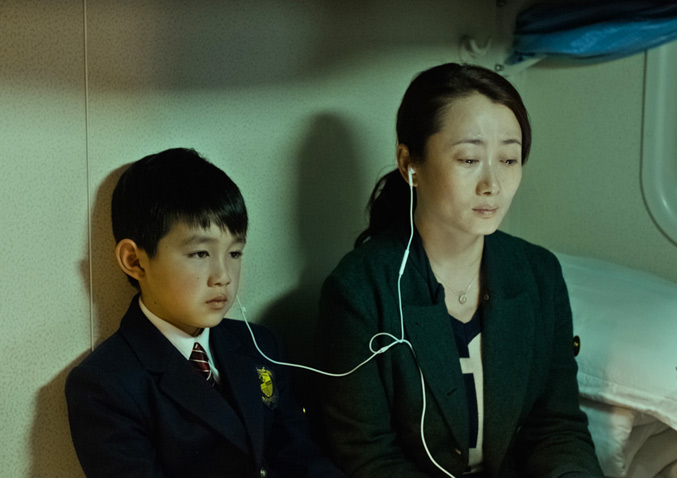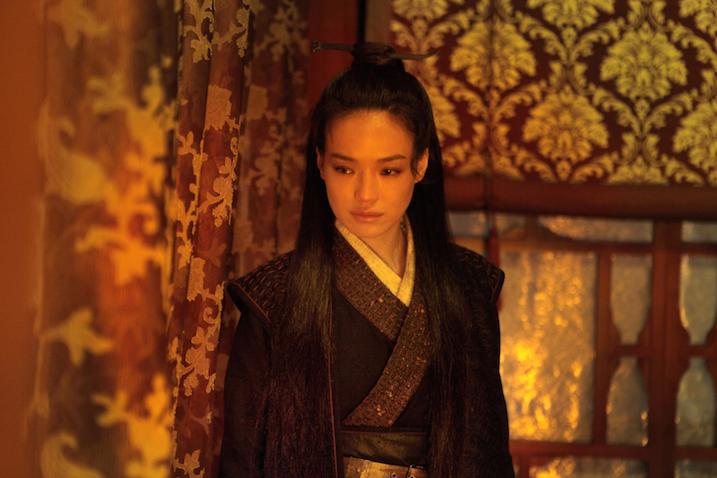By providing your information, you agree to our Terms of Use and our Privacy Policy. We use vendors that may also process your information to help provide our services. This site is protected by reCAPTCHA Enterprise and the Google Privacy Policy and Terms of Service apply.
Cannes: ‘The Assassin’ and ‘Mountains May Depart’ Present Exciting New Visions of the Far East
Eric Kohn

READ MORE: The 2015 Indiewire Cannes Bible
Editor’s note: This essay was originally published during the 2015 Cannes Film Festival. “Mountains May Depart” and “The Assassin” are out now.
This year’s Cannes Film Festival lineup may not represent every aspect of world cinema — the Official Selection is especially skimpy on Latin American titles — but at least one region receives fair representation: Asia surfaces with three movies in competition, one of which screened on the very first day, Hirokazu Kore-eda’s “Our Little Sister.” While the Japanese director’s work fit with expectations of the perceptive low key dramas that Kore-eda typically churns out, there were far more specifically regional achievements to be found with entries from China and Taiwan, both of which ranked among the best this year’s festival had to offer.
Jia Zhangke’s “Mountains May Depart,” a decade-spanning look at a lower class Chinese family marred by misguided ambitions stretched across multiple generations, offers a more intimate look at modern Chinese anxieties than the director’s previous work, the Cannes-winning “A Touch of Sin.” In that 2013 drama, Jia intertwined a series of violent stories reflecting various problems associated with repression and the work force. “Mountains May Depart” delves into some of those same topics, but with a beguiling structure and many intricate surprises.
It opens in 1999, when the young Tao (Jia’s partner and usual collaborator Zhao Tao), entrenched in a relationship with coal miner Liang (Liang Jingdong), gets lured away by Jingsheng (Zhang Li), a wealthy businessman who woos her with his pool of resources while poor Liang winds up relegated to the sidelines. This alone might form one of the somber chapters in “A Touch of Sin,” but rather than culminating there, Jia advances to 2014, when the woman’s son — bluntly named “Dollar” by his capitalist father — grows up in a strange new world, while the well-intentioned man that Tao abandoned continues to slink into obscurity.
Then “Mountains May Depart” takes its oddest step forward, advancing to Australia in 2025, where moody youth Dollar has been raised by a father he resents, forgotten his native tongue, and considers dropping out of college to visit his mother. Despite the erratic nature of this shift, “Mountains May Depart” maintains a novelistic sweep, its small team of characters developing into credible centerpieces of the story’s fragile emotions even as they maintain a grander symbolic value pointing to China’s encroaching overload of Western ideals.
 Jia’s crisp images lend a poetic eloquence to the story as it cycles through three different aspect ratios and hovers in a dreamlike state, at once conveying its characters’ conflicted mindsets and portraying their conflicts with an indifferent world. Opening with a vivacious scene of partying Chinese citizens grooving to the Pet Shop Boys’ “Slow West,” the movie closes with a far more melancholic version of the same bit, suggesting that in the rush to modernize, China has abandoned its soul. Poor Dollar comes across as the greatest victim in this unseemly equation.
Jia’s crisp images lend a poetic eloquence to the story as it cycles through three different aspect ratios and hovers in a dreamlike state, at once conveying its characters’ conflicted mindsets and portraying their conflicts with an indifferent world. Opening with a vivacious scene of partying Chinese citizens grooving to the Pet Shop Boys’ “Slow West,” the movie closes with a far more melancholic version of the same bit, suggesting that in the rush to modernize, China has abandoned its soul. Poor Dollar comes across as the greatest victim in this unseemly equation.
As a moody young man in a world defined by technological prowess, he feels disconnected from any semblance of a support system. “Google Translate is your real son,” he tells his estranged father. Dollar eventually forms a provocative romance with a much older woman who in theory helps to connect his desires with the more accommodating world that preceded his existence, but this too winds up being a misnomer; Dollar struggles to accept that he’s part of a system that treats him like the currency for which he’s named.
Delicately performed with a unique pace throughout, “Mountains May Depart” at times carries the whiff of ridiculousness, particularly during its uneven futuristic passages — which mark the only time Jia has delivered scenes in the English language. The result, unlike the visuals, isn’t pretty; the dialogue sounds patently unconvincing to the point where the whole project threatens to derail into amateur territory. Fortunately, Jia’s mature, patient storytelling rescues the sharp intelligence at the root of the drama.
READ MORE The Secret to the Success of the Cannes Film Festival
The movie’s epic scope unearths dark anxieties associated with Chinese identity on the brink of a new era, when neither old or young generations can get a grasp on the nation’s priorities. Jia suggests the very idea of a consumer-oriented future may relegate personal desire to the history books.
 Not that China’s priorities have ever come easily to the country, as one can readily see in magisterial filmmaker Hou Hsiao-Hsien‘s spectacularly gorgeous period drama “The Assassin.” The justifiably beloved competition entry marks the director’s first feature since 2007’s “Flight of the Red Balloon.” It was worth the wait and then some.
Not that China’s priorities have ever come easily to the country, as one can readily see in magisterial filmmaker Hou Hsiao-Hsien‘s spectacularly gorgeous period drama “The Assassin.” The justifiably beloved competition entry marks the director’s first feature since 2007’s “Flight of the Red Balloon.” It was worth the wait and then some.
Hou’s delicately framed tale unfolds against the backdrop of the 9th century, in China’s powerful Weibo district, where the eponymous killer Yinniang (Shu Qi) was kidnapped during her childhood and trained in her murderous ways by a menacing white-clad nun named Jiaxin (Sheau Fang-yi).
In a sensational black-and-white prologue shot in the box-like Academy ratio, Hou opens with a visual sophistication that sets the stage for the lush events to come: Yinniang takes down a series of horseback riders, but lets one of them live. In response, the cold-hearted Jiaxin assigns Yinniang with a new mission bound to challenge any semblance of moral inclinations and toughen her up — murdering the governor of Weibo, her cousin.
READ MORE: Cannes: We Break Down This Year’s Jury
The plot doesn’t go much further than that, but Hou’s slow-burn aesthetic takes charge to wondrous effect. The rest of the movie opens up to a 1.85:1 ratio and, more importantly, a vivid color palette that turns every frame into a rich work of art littered with details.  Hou’s typical framing technique, dominated by long shots that situate his characters in expansive worlds, works to remarkable effect here as he continually shifts from Yinniang’s series of calculated approaches toward her target and the governor’s baffled reactions as he remains alive following each encounter. She moves like lightening and barely makes a sound. What’s holding her back from getting the deed done?
Hou’s typical framing technique, dominated by long shots that situate his characters in expansive worlds, works to remarkable effect here as he continually shifts from Yinniang’s series of calculated approaches toward her target and the governor’s baffled reactions as he remains alive following each encounter. She moves like lightening and barely makes a sound. What’s holding her back from getting the deed done?
It turns out the relatives’ history is more complex than simply a bloodline, and Yinniang’s ongoing hesitation to commit her act imbues the atmospheric proceedings with a quiet suspense over the psychological hurdles she’s working through every step of the way. While the nun berates her apparent sympathetic impulses, Yinniang seems to be waking up for a nightmarish state many decades long.
The ongoing tension of Yinniang’s evolving mindset benefits from Hou’s ability to repeatedly burst the muted tableaux with swift, involving action sequences featuring dicey swordplay and nimble bodies jetting through the air. Like Wong Kar-wai’s “The Grandmaster,” Hou has borrowed tropes from China’s wuxia martial arts genre and repurposed them in a deeper context, delving into the country’s mythological dimensions and unearthing the ambiguous human tendencies of the era that have been buried with time. Yinniang is a slave of menacing forces that she can only combat by maintaining her individuality.
Alternately set in hulking palaces and wide open fields, Hou’s portrait of this struggle unfolds exclusively in poetic terms, an uncompromising approach that belongs to his own self-made rulebook of narrative engagement. That may not be enough for some impatient viewers, but those willing to become immersed in the hypnotic proceedings will grow attuned to the meditative rhythms guiding each scene to the next, and access the bigger ideas behind them.
 Yinniang’s resistance to authority, and her burgeoning desire to forge a separate path, taps into a broader set events in the midst of China’s declining Tang Dynasty, which collapsed in the first decade of the century when “The Assassin” takes place. Much like the disillusioned Dollar in Jia’s “Mountains May Depart,” Yinniang’s existence has been commodified, and she can only break that cycle through outright rebellion against the system holding her in place.
Yinniang’s resistance to authority, and her burgeoning desire to forge a separate path, taps into a broader set events in the midst of China’s declining Tang Dynasty, which collapsed in the first decade of the century when “The Assassin” takes place. Much like the disillusioned Dollar in Jia’s “Mountains May Depart,” Yinniang’s existence has been commodified, and she can only break that cycle through outright rebellion against the system holding her in place.
With its advanced set of themes, “The Assassin” has a startlingly modern hook. The snapshot of historical progress is also a parable for all times. In the final shot, the director finds his subjects marching off in the distance, vanishing into time, but by that point they feel closer to us than ever before.
READ MORE: Indiewire Podcast: Indiewire’s Editors Debate the Quality of Cannes 2015 So Far
By providing your information, you agree to our Terms of Use and our Privacy Policy. We use vendors that may also process your information to help provide our services. This site is protected by reCAPTCHA Enterprise and the Google Privacy Policy and Terms of Service apply.
















